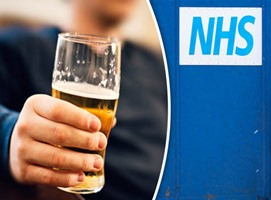
Alcoholism, also referred to as alcohol use disorder has always been a major problem in the UK. However, in the last five decades alcoholism rates have increased by more than 50 percent, resulting in a huge rise in alcohol-related deaths, illness, mental health issues, and hospital admissions.
When discussing alcoholism, many think about middle-aged people who have been drinking for most of their lives. In fact, alcohol addiction has become an issue for both for legal-aged drinkers and underage drinkers and can affect people of any age.
Using the latest data collected by the Office for National Statistics (ONS), the NHS and UK government, we have compiled a list of the most important statistics on alcoholism and alcohol abuse in the UK.
Alcohol Consumption in the UK
One unit of alcohol equates to 10ml of pure alcohol, which is equivalent to a half-pint of normal strength beer, 25ml of hard liquor, or a small glass of wine in the UK.
Binge drinking is characterised by consuming more than six to eight units of alcohol at any one time. If you intend to drink alcohol regularly, it is recommended that these units are spread out over several days.

However, according to a 2018 public survey carried out by the ONS, 24 percent of adults in England and Scotland regularly drink at hazardous levels [1] [2] with 27 percent of drinkers admitting to binge drinking on their “heaviest days”. For men this would mean consuming over eight units of alcohol, and over six units for women.
A later survey carried out by the Welsh Government in 2019 [3] reported that 18 percent of adults in Wales admitted to exceeding 14 units of alcohol per week. This is considered heavy alcohol consumption. Unsurprisingly, alcohol-related hospitalisations from Wales have increased by is 3.3 percent.
As of 2018, there were estimated to be over 602,391 alcohol-dependent drinkers in England, with only 18 percent of these receiving some form of addiction treatment. [4]
The price of alcohol has been steadily decreasing since 2009, and as of 2019, alcohol is more affordable than it was in the 1980s, making it more accessible to. [5]
Alcohol and Health
When discussing alcohol and how it can affect our health, many people fail to understand the true nature of the damage it can cause both physically and psychologically.
Alcohol can damage vital organs such as the liver, kidneys, heart, and brain, and many assume that long-term drinkers are the ones experiencing the side effects of years and years of binge drinking.

However, data from the ONS found that alcohol abuse is still the biggest factor for death, illness, and disability amongst people between the ages of 15 and 49 years old in the UK [6] making it the fifth biggest risk factor across all ages. Alcohol abuse was also the primary factor in more than 60 medical conditions, including cancer of the throat, mouth, stomach, liver, and breast, in addition to high blood pressure, depression, and cirrhosis of the liver.
Unfortunately, the Covid-19 pandemic has seen a significant rise in people suffering from alcohol addiction. Figures from 2020 found that there were 976,425 alcohol-related hospital admissions [7] 12 percent higher than in 2016/17. Alcohol-specific deaths also climbed to 7,423 (around 13 per 100,000 people). This is a 19.6 percent increase in deaths from 2019 [8].
Devastatingly, data collected by PHE in 2018, found that there were over 314,000 potential years of life lost as a direct result of alcohol abuse. This is the highest number since 2011 [7] As a result, hospital admissions due to alcoholic liver disease in England have increased 18 percent from 2017 to 2020.
Alcohol Addiction Treatment Statistics UK
Unfortunately, private addiction treatment is not an option for everyone, and although this is predominantly a financial issue, culture and religion also play a major role due to the communal disapproval of alcohol.
PHE reports that the average age for people in rehab for alcohol addiction is 46, with 60 percent being male, and 84 percent white British, compared with 80 percent of the population. In comparison, only 5 percent of people in treatment were other white ethnicities [9].
The same data collected by a UK Government survey found that 60 percent of people in alcohol treatment also required mental health treatment. Over 20 percent of those surveyed were not receiving any treatment for mental health issues [9]. However, 13,349 people in treatment were receiving medication for withdrawal and alcohol dependence.
These statistics demonstrate the worrying impact of mental health issues on the development of addiction, and how many of those in need of psychological intervention are not receiving it before entering treatment.

If you or someone you care about is struggling with alcohol addiction, it’s important that you reach out as soon as possible. Alcoholism is a progressive disease and requires treatment at a registered facility in order to manage the physical and psychological effects. We understand how overwhelming it can be to take the first steps towards recovery, but you’re not alone. Our dedicated team are here to help you find the best treatment for you or your loved one.
References
[1] Office for National Statistics 2018
[2] Scottish Government 2018/2020
[6] The Public Health Burden of Alcohol: Evidence Review
[7] Public Health England 2019/20
[8] Office for National Statistics 2020
[9] Public Health England: Adult Substance Misuse Treatment Statistics 2019 to 2020: Report


